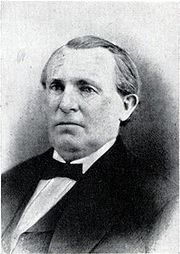
Curtis Hooks Brogden
Encyclopedia

Governor of North Carolina
The Governor of North Carolina is the chief executive of the State of North Carolina, one of the U.S. states. The current governor is Bev Perdue, North Carolina's first female governor.-Powers:...
of the U.S. state
U.S. state
A U.S. state is any one of the 50 federated states of the United States of America that share sovereignty with the federal government. Because of this shared sovereignty, an American is a citizen both of the federal entity and of his or her state of domicile. Four states use the official title of...
of North Carolina
North Carolina
North Carolina is a state located in the southeastern United States. The state borders South Carolina and Georgia to the south, Tennessee to the west and Virginia to the north. North Carolina contains 100 counties. Its capital is Raleigh, and its largest city is Charlotte...
from 1874 to 1877.
He was born in Goldsboro, North Carolina
Goldsboro, North Carolina
Goldsboro is a city in Wayne County, North Carolina, United States. The population was 37,597 at the 2008 census estimate. It is the principal city of and is included in the Goldsboro, North Carolina Metropolitan Statistical Area. The nearby town of Waynesboro was founded in 1787 and Goldsboro was...
, the son of a local farmer. Brogden joined the North Carolina state militia at the age of 18 and rose to the rank of major general
Major General
Major general or major-general is a military rank used in many countries. It is derived from the older rank of sergeant major general. A major general is a high-ranking officer, normally subordinate to the rank of lieutenant general and senior to the ranks of brigadier and brigadier general...
. First elected to the North Carolina House of Commons in 1838 as a Democrat, he served in the House for nearly 15 years, until 1851. In 1838, he was also elected Wayne County
Wayne County, North Carolina
- Cities and towns :*Brogden*Dudley*Elroy*Eureka*Fremont*Goldsboro*Mar-Mac*Mount Olive*Pikeville*Rosewood*Seven Springs*Walnut Creek*Grantham-Geography:According to the U.S...
Justice of the Peace, a position he held for twenty consecutive years.
In 1852, Brogden rose to the North Carolina Senate
North Carolina Senate
The North Carolina Senate is one of the two houses of the North Carolina General Assembly.Its prerogatives and powers are similar to those of the other house, the House of Representatives. Its members do, however, represent districts that are larger than those of their colleagues in the House. The...
, where he served until 1857, when he was named North Carolina Comptroller by the General Assembly
North Carolina General Assembly
The North Carolina General Assembly is the state legislature of the U.S. state of North Carolina. The General Assembly drafts and legislates the state laws of North Carolina, also known as the General Statutes...
. Brogden briefly left the senate in 1867; during the span from 1867 to 1868, he represented Wayne County at a state constitutional convention and was a member of the Electoral College supporting Ulysses S. Grant
Ulysses S. Grant
Ulysses S. Grant was the 18th President of the United States as well as military commander during the Civil War and post-war Reconstruction periods. Under Grant's command, the Union Army defeated the Confederate military and ended the Confederate States of America...
.
Brogden returned to the North Carolina Senate in 1868 and served for four years until he was elected lieutenant governor on the Republican ticket with Tod R. Caldwell. When Gov. Caldwell died in office, Brogden succeeded to the position of governor. During his term in office, the state saw the re-opening of the University of North Carolina at Chapel Hill
University of North Carolina at Chapel Hill
The University of North Carolina at Chapel Hill is a public research university located in Chapel Hill, North Carolina, United States...
; Brogden also called for the formation of a black college and a state penitentiary.
At the end of his term as governor, Brogden was elected to the United States House of Representatives
United States House of Representatives
The United States House of Representatives is one of the two Houses of the United States Congress, the bicameral legislature which also includes the Senate.The composition and powers of the House are established in Article One of the Constitution...
, where he served only one term (1877–1879), after which he retired from public life (with the exception of a single term, in 1887, representing Wayne County in the North Carolina House of Representatives).
Brogden died in his hometown of Goldsboro in 1901 and is buried there.

